`
Everyone who reads Cote de Texas knows how much I admire Houston interior designer Carol Glasser. As I pointed out to you a few weeks ago, her advertisement alone says it all: the gorgeous painted antique console, the gilt mirror, the blue and white, the wonderful celadon wallpaper, the lone altar stick with its gold taper. Glasser is a meticulous designer, she hand picks every item, nothing comes easily from a catalogue or a showroom. Instead she searches out the perfect item and doesn’t let time rush her – her clients may wait for Glasser to make her final choice, but, the wait is worth it, no doubt.
Ad photographed by James Farmer (jfarmer762@yahoo.com) for Antique Shops & Designers magazine here.
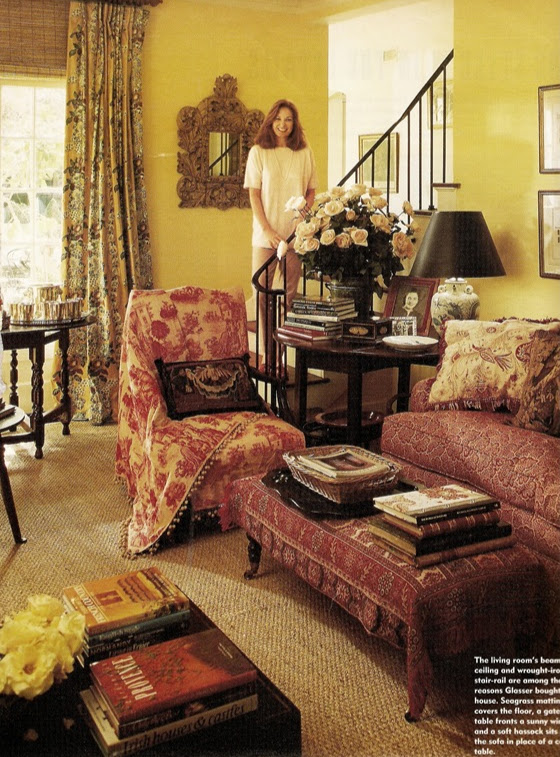 The designer Carol Glasser, featured in a no longer published local magazine, stands on the stairs of her former house. To read more about her and her “One Perfect House,” please go HERE.
The designer Carol Glasser, featured in a no longer published local magazine, stands on the stairs of her former house. To read more about her and her “One Perfect House,” please go HERE.
Over the years Glasser’s style has had a large influence on mine. She was and remains someone whose style and taste I admire greatly. With each magazine article about her “One Perfect House” – I would hungrily study every detail and see how I could incorporate her look into my own house – mostly very unsuccessfully, I can assure you. Without a doubt, the greatest impact Glasser made on me, and legions of other rabid fans throughout the United States, was with her 10’ long Welsh dresser, laden with a huge and gorgeous collection of blue and white transferware. Through a friend, who was also her client, I had heard about the collection but hadn’t seen it – until this photo above was published. No picture that I can recall ever affected my decorating quite as much, and so, almost 18 years ago, I began my own collection of blue and white transferware – to emulate this. Of course, I didn’t have the 10’ long Welsh dresser, nor the wall space for one either. But I did manage to purchase a small French china cabinet at Joyce Horn, from whom I have bought many of the antiques in my house.
Another magazine photoshoot with basically the same styling of the Welsh dresser. Notice all the white ironstone mixed in with the blue and white transferware.

But as soon I as tried to copy Glasser, she changed. For the next magazine photoshoot (Veranda) Glasser showed her dresser looking very different – the masses of transferware dinner plates were gone, replaced with faience and delft and other pottery. The ironstone was regulated to the bottom ledge and only the transferware platters remained. Well, you know I didn’t like THIS as much – and just ignored her changes, continuing to grow my own collection – inspired by her original one! I was more true to Glasser than she was to herself! In truth, who knows what her dresser really looked like. It’s quite possible that all the other pottery was just borrowed for the photoshoot to change it up – after all it had already been seen twice, wouldn’t three times - styled the same way - be too much? It may just be that right after the photoshoot – the dresser went back to all ironstone and transferware – I don’t know but I have my suspicions, as all the delft and faience was never seen again.
And even later, when Glasser’s house appeared in a recent book – the family room had changed yet again: toile curtains replaced the checks, chairs replaced the wicker, and French yelloware replaced the delft and faience brought in for the Veranda shoot.
Finally, one last time, before Glasser sold her house and moved, the Welsh dresser appeared in yet another book, again heavily accessorized with yelloware and ironstone and just bits of transferware. I have a feeling that this is how it truly looked – that this wasn’t staged for the photoshoot. This styling reflects a more natural evolution of the dresser over a 15 year span – from all transferware to a more relaxed mixture of rustic French and English stoneware. Here too, all new furniture appeared, most likely her own, again. This family room is so casual, welcoming, cozy and inviting – everything a family room should be. Soon after this photo – the house was sold, painted white, and furnished in creams, taupes, and whites – any remaining traces of Glasser were erased in a large remodeling. But where does this leave me with all my blue and white?
Boy, this sure doesn’t compare to Glasser’s , does it? I’m brave to show this!!!! My dresser and collection is quite small next to hers, but I’ve been happy with the way it looked for years. I purchased the china cabinet right after we moved in our house over 15 years ago. It’s lasted through many changes: where once there was a muted Bennison table cloth, there is now a yellow silk plaid one. Where there were no curtains, now silk ticking hangs over the French doors. Seagrass covers the wood floors that for years were bare, and French chairs replaced an assortment of other sets that have come and gone.
I hung a set of brown and white plates to make the small dresser appear wider.
Extra blue and white transferware platters moved to the kitchen with the white ironstone.
But, in truth, I was getting tired of the blue and white plates and wanted a change. I slowly started collecting something new to put in the breakfront. Here, for a Tablescape Tuesday I debuted my new obsession – I set the table with newly purchased creamware.
I had slowly started buying creamware on Ebay. And this time, it was not Carol Glasser that inspired me, but Dan Carithers.
Part of Dan Carither’s Creamware Collection
Atlanta interior designer Dan Carithers owns the most beautiful collection of creamware or Queensware – first developed by Josiah Wedgewood in the early 1760s. Creamware is not porcelain, rather it is pottery or earthenware with a glaze. At the time, this new cream-colored pottery was the lightest of glazes available and Queen Charlotte, wife of George III, was a great admirer of it. Wedgewood had partners along with way, and he was very successful with creamware – he died a wealthy man due to the overwhelming popularity of his light colored dishes. Though the years, there have been different factories that produced creamware and it is still in production today - made in exactly the same manner, using the same molds. Creamware can be plain or highly decorated: pierced, scalloped and reticulated are its trademarks. Some versions come in additional colors that highlight the edges and scallops. Carither’s collection is quite fine and worth a small fortune. Collecting creamware can be pricey if you are picky. I am not so picky! I like the look of it and realize that in order to get the look, I can’t afford to be so discriminate. I am more than willing to settle for a newer piece with some age – than go into debt to buy the original.
A close up of Carithers’ fantastic creamware collection.
Here, in a house designed by Carithers, he used creamware plates on a wall – his designs frequently incorporate the light dishes. On a pedestal he layered a basket under a platter and added a smaller one above. Over the years, I have admired Carithers creamware collection greatly, but the thought of my starting over with a new collection was overwhelming.
A few years ago, this client of mine was also inspired by Dan Carithers to begin a creamware collection. She and her husband are very particular about the quality they acquire – and it shows. They have purchased wonderful pieces of great beauty - you can see in these plates the fine reticulated border – a sign of good creamware. They buy their pieces at antique shows – not Ebay – and have developed relationships with several vendors who specialize in the light color wares.
Here a creamware plate rests next to a French barometer, which is on my bucket list! These clients have spread their collection throughout the public areas of their house. The creamware mixes so beautifully with their decor – which is done in shades of creams and light golds. The walls are a softly painted creamy yellow with all trim work done in light gray. These colors are all so soothing and calm.
My clients placed many of their creamware pieces on the buffet in their dining room. You can see their pieces are all different – pierced, reticulated, and scalloped. As their collection grew, I grew greener with envy! I so wanted to change out the blue and white transferware – I even considered just putting up my white wedding dishes on the shelves!
My hero, John Saladino, collects creamware too – here at Villa Dilemma, he puts the plates up high. At the end of one axis, he uses an oversized creamware platter on a counter as a focal point.
And finally, another large influence on me was the movie Something’s Gotta Give. Though this collection is a mixture of ironstone and creamware – new pieces, vintage and antique ones – this was the look I wanted in my dining room, soft with no strong contrasts, in shades of creams, yellows and gold. Where to start????
This past year, I decided to just check out Ebay and see what was available, how the quality was, what the prices were. Much to my surprise – I found there were a few creamware pieces at very reasonable prices. Jackpot! I slowly began bidding on pieces and won a few. Some I purchased outright on the Buy It Now program. In the beginning, I placed my tiny collection on a small desk, but it started getting crowded and recently I realized that possibly, just possibly, I might soon be able to replace the blue and white transferware on my dresser with the creamware. At last week’s Round Top, I found a dealer who had a large inventory of creamware – not the quality of Dan Carither’s or my client’s – but she had plates and that’s what I needed. I quickly picked out three pairs of plates and a few singles. I could barely contain myself driving home, thinking that finally I was going to have a new look in my dining room! And even more exciting was I had not planned on finding any creamware at Round Top – it was fate!
Here’s my dining room with all the creamware – no more blue and white transferware. Yeah!!!! It’s all gone on an extended holiday. While I still have holes to fill in – the Round Top purchases made it possible to finally trade it all out. I need a few pieces for the top of the dresser, and the shelves, and maybe for the top of the dining table itself. But – I’m so excited! I think it really transformed the look of the room and makes it more sophisticated in a way. I would love to update my chairs – with painted ones instead of stained ones, but that’s on hold for awhile, while we wait for Obama’s magic to work on the economy. :) But for now, I am so thrilled just to enjoy the changes I’ve already made.
The day after the change out – my mom Betty Rae and my sister Cathy came over give their approval. I think they really liked it.
A close up of the creamware. I love the little baskets.
I still need something on the top shelf, but after looking on Ebay and Ruby Lane today – I couldn’t find anything. I’ll find it – I’m in no hurrynow. That’s the fun of collecting something – waiting to find the next piece. Even though the internet has completely changed antique collecting forever – it’s still fun. Instead of sloshing through damp fields at 5:00 in the morning, you slosh through the vast world of Google.
I found this beautiful plate for sale online – it’s not a creamware glaze, but a salt glaze which gives it a more matte finish. Isn’t it gorgeous?
An example of an original Wedgewood piece from the 18th century – sure would be nice!
Another original Wedgewood piece of creamware – look at that date! Amazing!
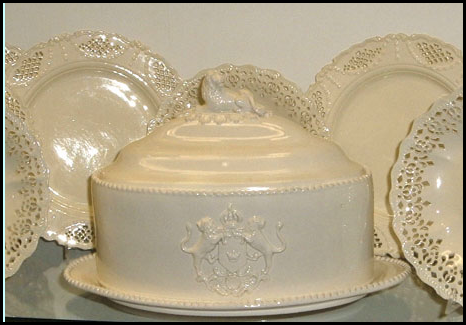 The finest creamware for sale!
The finest creamware for sale!
Tone on Tone has this gorgeous creamware bowl for sale on their web site here.
Another piece available from Tone on Tone.
So, what else did I buy from Round Top besides the zebra rug for my client? When I saw this picture of a Round Top booth on Hill Country House’s blog (my former sister-in-law) – I laughed out loud. Ann and I swear we are just alike and wish we were still related – what fun we would have antiquing! You see - SHE took this picture of the clock that I bought. I had been wanting something to hang over my new casement window in my kitchen – I had bought a huge faux cow’s head from Wisteria that was, well, too big. And I didn’t want a reproduction clock that you see everywhere. When I saw this French clock – AND the price – I said Sold! I was thrilled!
And here it is hanging in my kitchen the next day! I just love it. Even Mr. Slipper Socks Man noticed it immediately – which is unusual. He really loves it too – and even more unusual, my daughter also commented on it!
A sort of side view – you can see how deep it is. I’m not sure if it works or not – the vendor didn’t know. But that doesn’t matter, at least not now. About an hour after hanging the clock, it came crashing down in a million pieces. Shattered everywhere - beyond repair. I was horrified, but thankfully no one was beheaded. Mr. Slipper Socks Man was furious at me for not hanging it properly. Now, listen, I am an interior designer – I have hung hundreds of objects on the walls over the years and, as I asked him, “has anything in our house ever fallen down before?” He had to concede - No. Of course not. I have no idea what happened – but hammering in the nail was a stretch for me, it was high over my head and I was scared of slipping and falling into the sink – perhaps in a hurry to get it all over with I didn’t hammer the nail in hard enough? Probably. Lesson learned. But it did look good for an hour.
So, now, instead of my gorgeous French antique clock that probably didn’t even work, I have this fake tole clock that used to be red, but I painted it black and gold. Whoo-wee! Isn’t it purdy???!!!!! I am a DOOFUS. Say it loud, say it proud.
Ann: Let me know if you find another clock like the one I bought at Round Top. Go ahead and buy it for me, I trust your taste!

Charlotte Moss is on the hot seat this week at The Skirted Roundtable – not to be missed, if I do say so myself. Listen HERE!!!! She is one fabulous woman!
An excellent article on collecting and the history of creamware is found HERE.
Another excellent article on the proper way to hang a clock is found HERE.



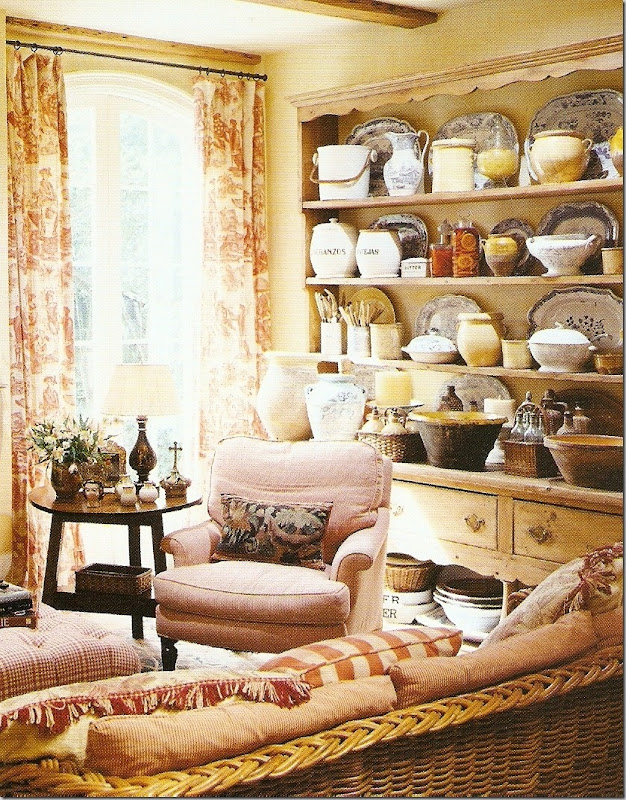
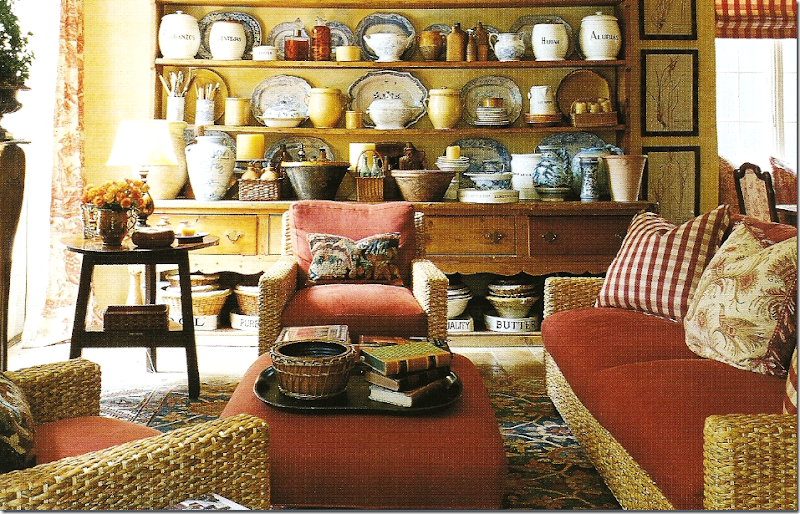
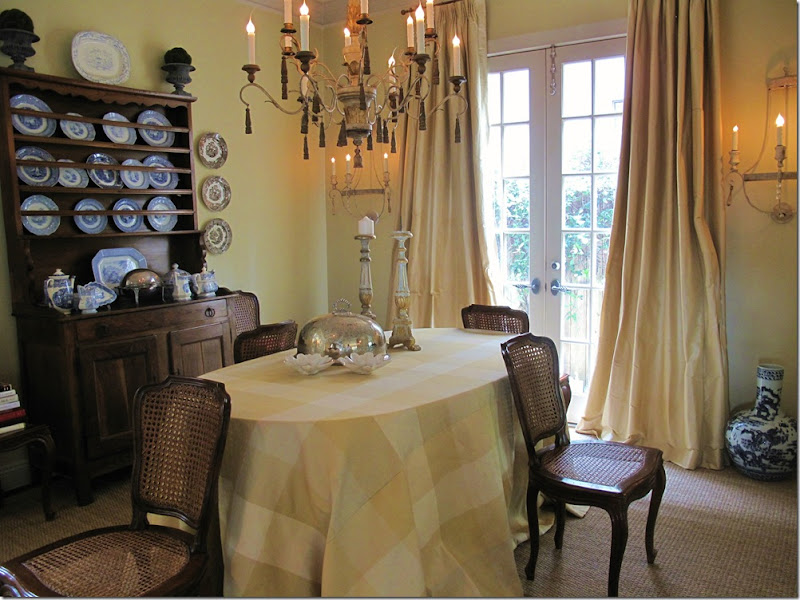


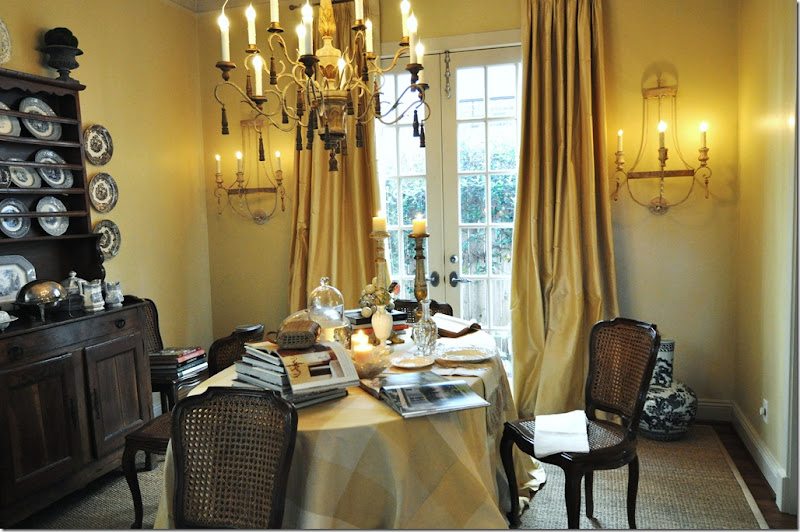
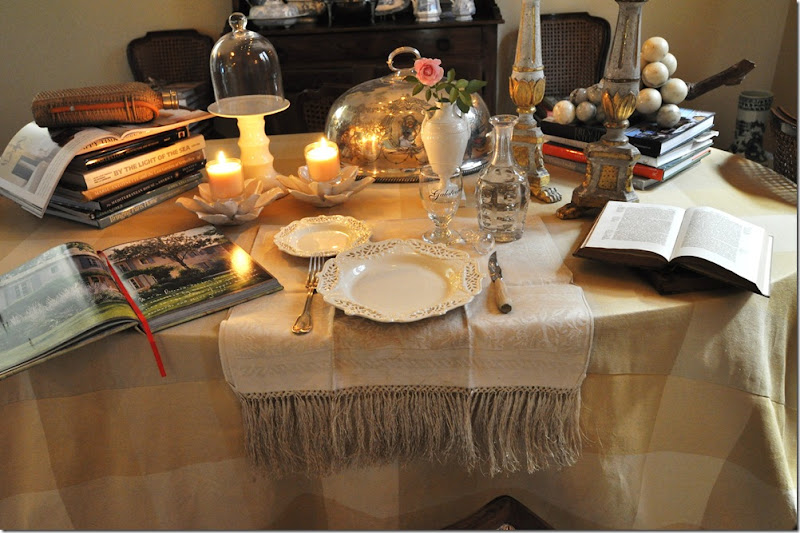
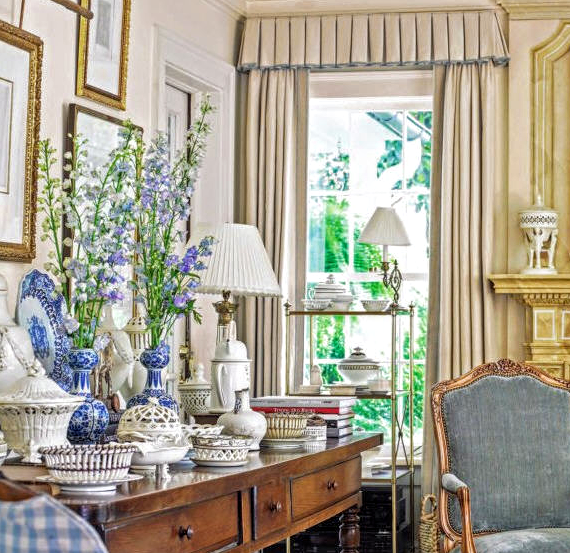
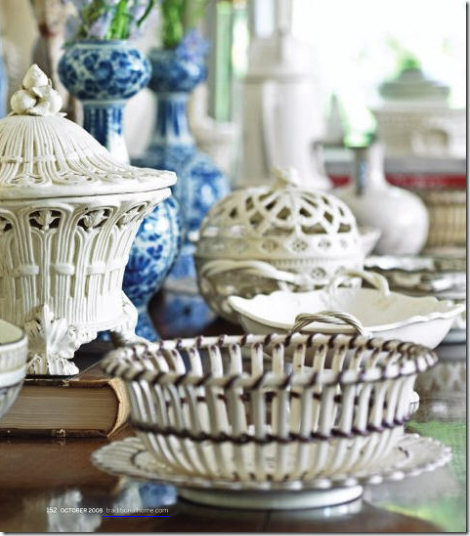
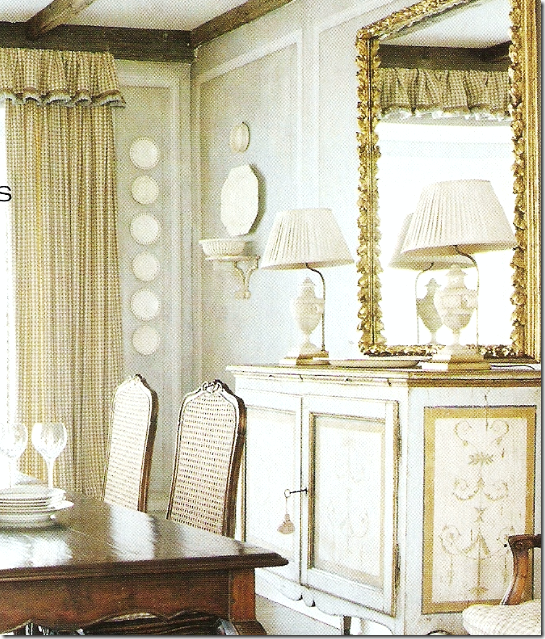



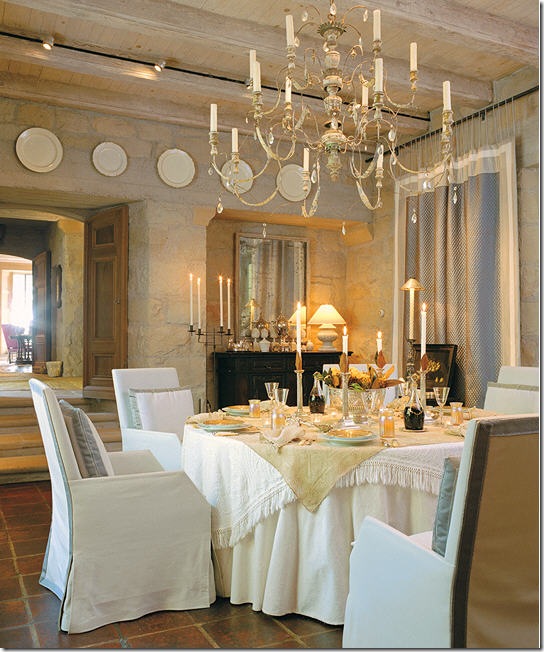


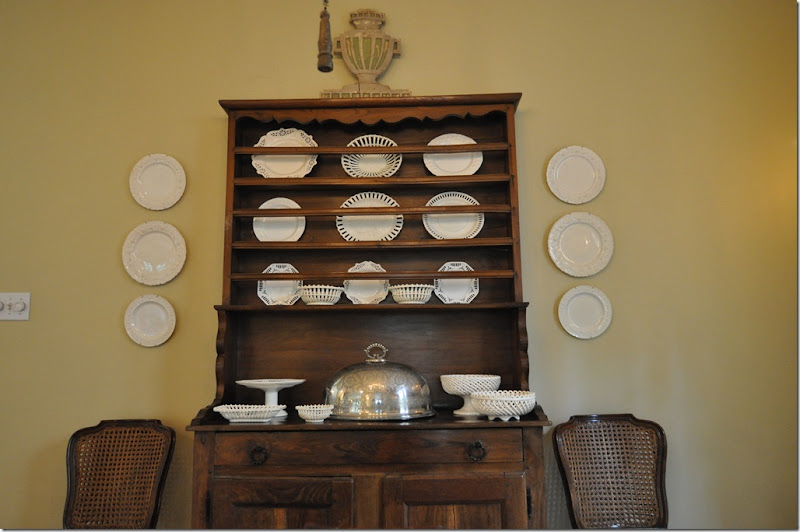

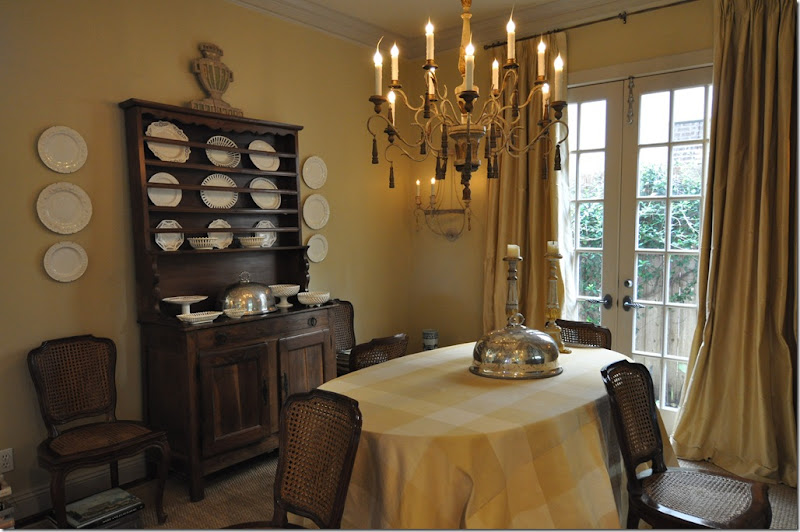
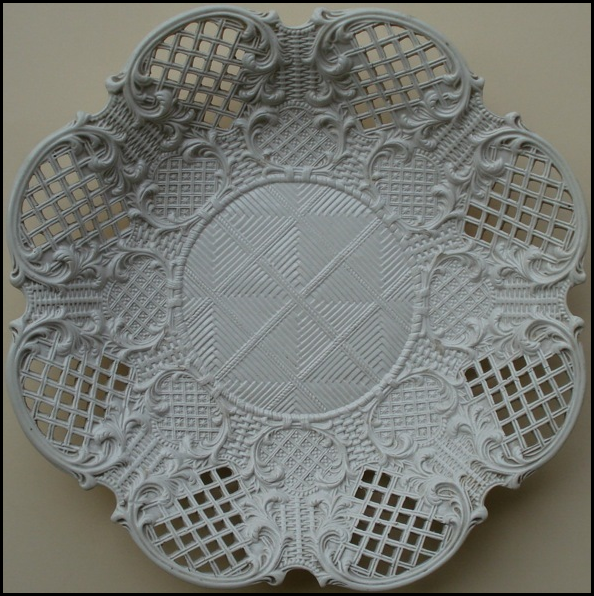
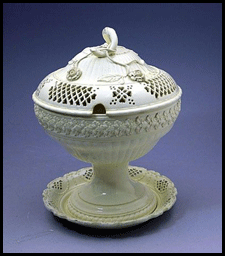

![[IMG_4912.JPG]](https://blogger.googleusercontent.com/img/b/R29vZ2xl/AVvXsEghTzJh9mNlrSNbqWiJ_pFl46PfX3OdxaegEunoRJVwuAUHYvMadujvsreqeUS4IpnEuO7r9_btJ7pmETXsAUcFxzJbtFAm1dwvBF3JXRcOHFXmVqRL5sL5QaTyJI0BHomTSEFQMsvtJAY/s1600/IMG_4912.JPG)
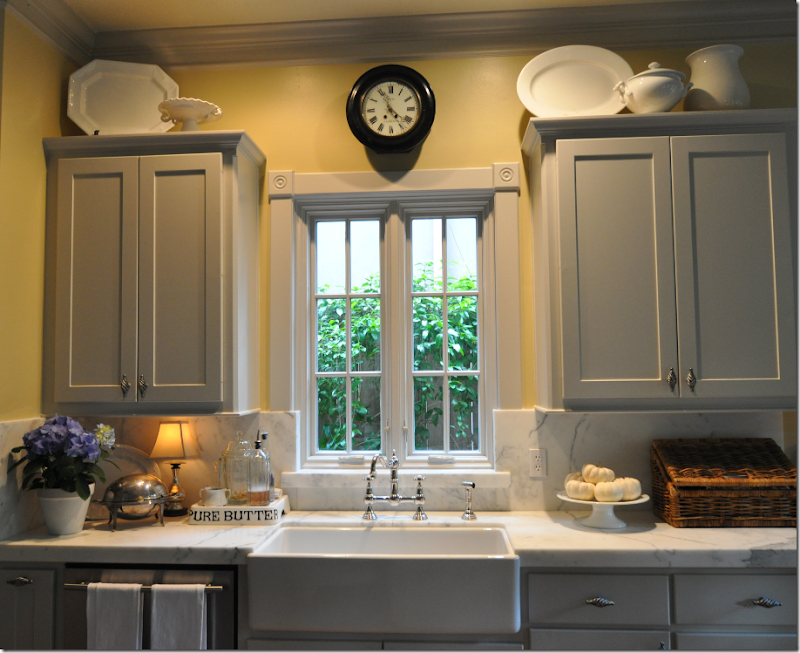
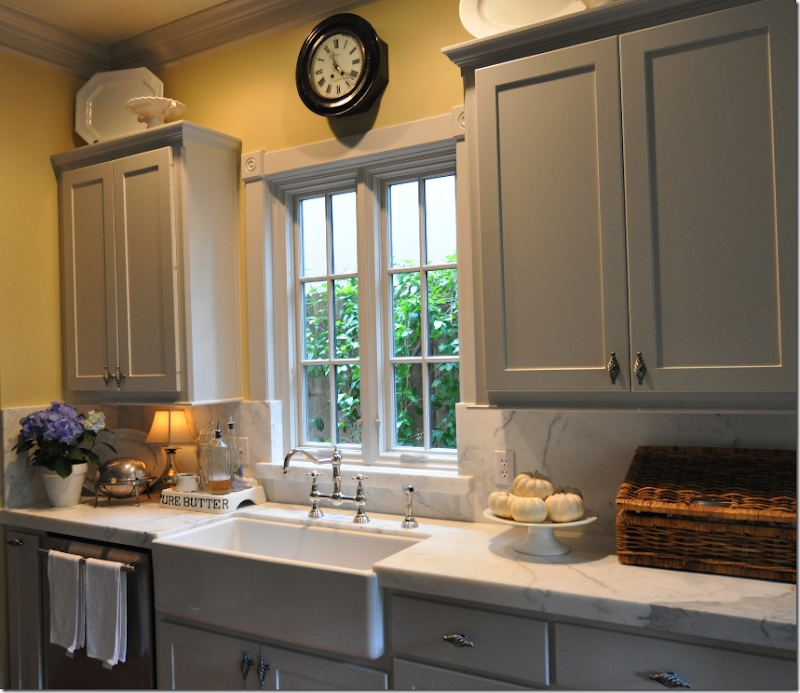
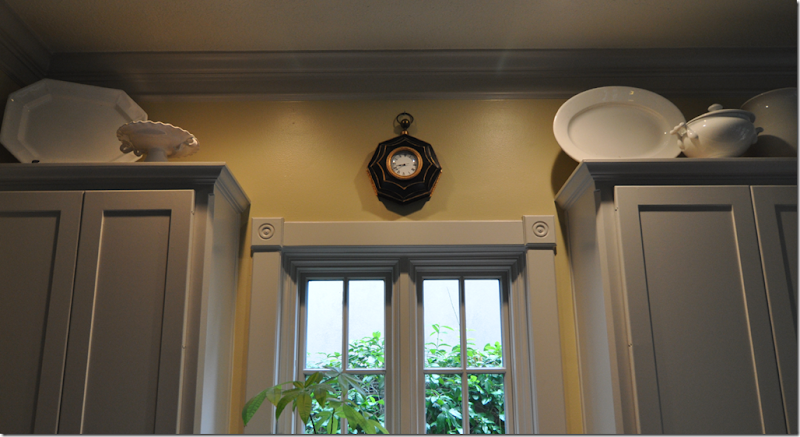
No hay comentarios.:
Publicar un comentario